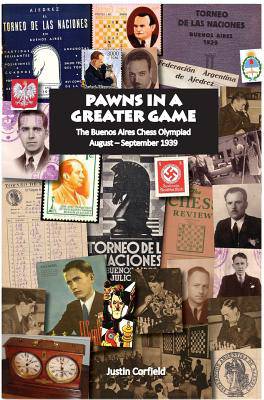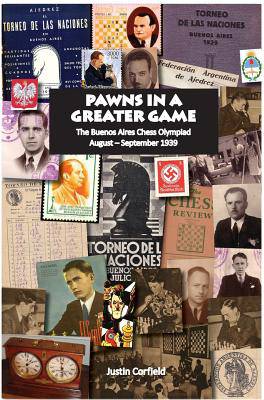
- Afhalen na 1 uur in een winkel met voorraad
- Gratis thuislevering in België vanaf € 30
- Ruim aanbod met 7 miljoen producten
- Afhalen na 1 uur in een winkel met voorraad
- Gratis thuislevering in België vanaf € 30
- Ruim aanbod met 7 miljoen producten
Zoeken
Pawns in a Greater Game
The Buenos Aires Chess Olympiad, August - September 1939
Justin Corfield
Hardcover | Engels
€ 96,95
+ 193 punten
Omschrijving
Chess has sometimes been at the centre of world politics as it was in the case of Bobby Fischer defeating Boris Spassky in 1972, and six years later when Anatoly Karpov defeated Russian dissident Viktor Korchnoi. Both matches were seen at the time, and also in hindsight, as battles between the Free World and the Communist Bloc, but neither can compare to the events at the 8th Chess Olympiad and the Women's Chess Championship, held in Buenos Aires in August-September 1939. Most of the chess players in 1939 came from countries which would be hugely changed by war: Germany, Poland, Bohemia-Moravia (Czechoslovakia), France, Britain, Norway, Sweden, the Netherlands, Belgium, Denmark, Estonia, Latvia, Lithuania, Bulgaria and Palestine. And there were few players whose lives were not totally affected by the conflict. In 1939, the Americans refused to turn up because they did not regard the money offered as adequate; an I.R.A. bomb scare nearly caused a British player to miss his train; the wife of one player was involved in a major literary controversy which was rocking Guatemala; and the voyage to Buenos Aires helped influence a novella by Stefan Zweig. The tournament began on the day that the Molotov-Ribbentrop Pact was signed, with the final round starting on the day Germany invaded Poland. By that time three of the English team had left, anxious to get across the Atlantic before the U-boats started attacks. And the day before the last round, with the final matches to decide whether the Germans or the Poles would win the Olympiad, the Soviet Union invaded Poland. By this time, the weaker teams had found themselves relegated to a second league, competing for a cup which turned out not to exist. The tensions around the start of World War II were replicated in Buenos Aires, with many of the chess players choosing to remain in South America rather than return to Europe being engulfed by war. Three English players became code-breakers at Bletchley Park, and of the other players, one died in a Buenos Aires lunatic asylum, one was murdered in the Holocaust, one served in the Wehrmacht, and another perished in a Soviet gulag; with the winner of the Women's Championship was killed in a V-1 attack on London. Using archival resources from around the world, and visits to Argentina and Uruguay, this book is the first to detail the machinations of the Buenos Aires Chess Olympiad which reflected, in so many ways, the political situation in 1939.
Specificaties
Betrokkenen
- Auteur(s):
- Uitgeverij:
Inhoud
- Aantal bladzijden:
- 398
- Taal:
- Engels
Eigenschappen
- Productcode (EAN):
- 9781876586287
- Verschijningsdatum:
- 17/03/2015
- Uitvoering:
- Hardcover
- Formaat:
- Genaaid
- Afmetingen:
- 170 mm x 244 mm
- Gewicht:
- 830 g

Alleen bij Standaard Boekhandel
+ 193 punten op je klantenkaart van Standaard Boekhandel
Beoordelingen
We publiceren alleen reviews die voldoen aan de voorwaarden voor reviews. Bekijk onze voorwaarden voor reviews.








